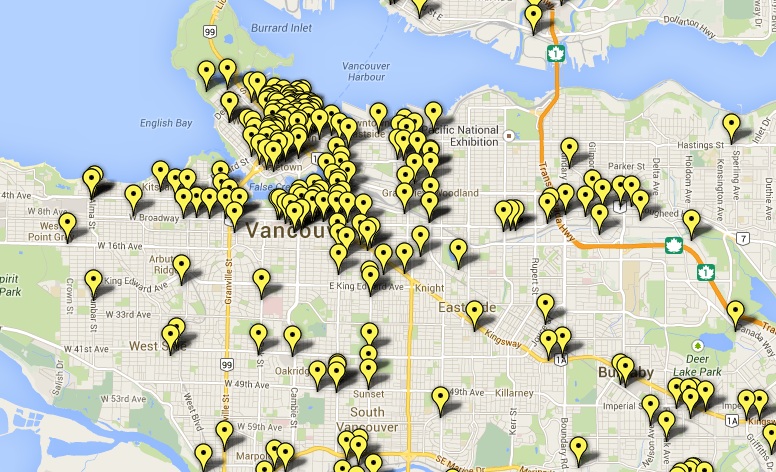VANCOUVER – The vast majority of temporary foreign workers approved in the two westernmost provinces were located in the three major urban centres, according to a new website mapping government authorizations.

That’s contrary to claims that the program is bolstering the workforce in rural or remote areas where resource companies struggle to recruit.
And the largest portion of the businesses that received authorizations, by far, were in the food service sector.
Of 511 Metro Vancouver businesses that received government authorization to recruit temporary foreign workers over a one-year period, 107 were restaurants, pubs or fast-food outlets — almost 21 per cent of the total. Everything from Megabite Pizza and Waves Coffee to Dead Frog Brewery and Doolin’s Irish Pub received approvals.
In Calgary, 299 of the 718 business that received authorizations in the same period were restaurants, pubs and fast-food outlets — 41 per cent. Those included a slew of Subway, Dairy Queen and many other franchises, as well as several mom-and-pop eateries.
“The majority of the people in those programs are not skilled workers working on construction projects where there’s a labour shortage,” Jim Sinclair, president of the B.C. Federation of Labour, said Wednesday.

Get daily National news
“They’re simply being used as cheap labour in large urban areas where there’s already tens of thousands of people unemployed.”
The website, NTFW.ca (http://ntfw.ca/map-companies-hiring-temporary-foreign-workers/), shows businesses in British Columbia and Alberta that successfully applied to the program up until the end of 2012.
The site has gone viral since it went live nine days ago, said map creator Rohana Rezel.
- Discovery of 2 skulls on Kamloops property leads to debate over B.C. property rights
- Families of teens killed in car crash say they are ‘destroyed’ as they fight ICBC
- 5 days of assessment ordered for man accused in B.C. RCMP officer’s death
- Surrey extortion victim being investigated for allegedly returning fire during shooting
The data came from the federal Human Resources and Skills Development ministry, which oversees the program. The lists were released through an access to information request.
“(The program) was instituted because there was a legitimate need for temporary workers,” Rezel said. “But unfortunately, what’s happened is that now increasingly Canadian workers are being replaced by temporary workers.”
Rezel has received some angry feedback from businesses.
While the website refers to “bad guys” who access the program, Rezel said he immigrated to Canada from Sri Lanka himself six years ago and is not against temporary foreign workers.”
But there are questions about the controversial program, and Canadians want to know which companies are — and are not — making use of it.
There are also questions about the treatment of temporary foreign workers in Canada, he said.
“It’s not just about the money,” Rezel said. “They can be exploited, they can be repressed. They have absolutely no rights. If they complain, you know what happens? They get deported.
“They have become very vulnerable.”
Only B.C. and Alberta have been mapped so far. Rezel said he’s waiting for more information from the Human Resources department so he can produce maps for other provinces.
A request for an interview with the federal employment minister or an official from the department was denied.
A statement from the ministry pointed out that a moratorium was announced last month on the food services sector, after the much-maligned program made headlines again over temporary foreign workers hired at a McDonald’s in Victoria.
Ottawa had already announced a blacklist for non-compliant employers and removed a “wage flexibility” clause that allowed employers to pay temporary foreign workers up to 15 per cent less than the prevailing wage. They also suspended an accelerated process for authorizations introduced in 2012.
“The Temporary Foreign Worker Program remains under ongoing review,” the email statement said.
—
Follow @ByDeneMoore on Twitter





Comments